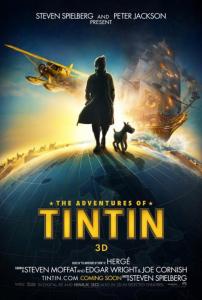 Steven Spielberg has a tendency to get a burst of energy every few years, directing a handful of films before disappearing again to produce everything, everywhere and plot his eventual return to the director’s chair. He’s got two coming out this month, and one — The Adventures of Tintin — arrives today, becoming Spielberg’s first feature since 2008’s Indiana Jones and the Kingdom of the Crystal Skull as well as his first animated feature as a director.
Steven Spielberg has a tendency to get a burst of energy every few years, directing a handful of films before disappearing again to produce everything, everywhere and plot his eventual return to the director’s chair. He’s got two coming out this month, and one — The Adventures of Tintin — arrives today, becoming Spielberg’s first feature since 2008’s Indiana Jones and the Kingdom of the Crystal Skull as well as his first animated feature as a director.
The movie is based on the comic book series created by Belgian artist Georges Remi, who published under the name Hergé. His collection of loosely related stories all follow a young Belgian reporter named Tintin, and his dog Milou (Snowy, in English translations). Spielberg nabbed the rights to the series in 1983, shortly after Remi’s death, and he’s worked since then at various times to bring the comic creator’s world and colorful characters to the big screen. The Adventures of Tintin is the result of those efforts, a computer animated 3D action/adventure adapted from a trio of Tintin books that were released in the early ’40s.
Spielberg’s talents as a filmmaker and reputation as the man who created the blockbuster movie (see: Jaws) are on full display in this animated romp. It’s a little light on story, but the action-oriented set pieces fly fast and frequently. The bulk of the movie is consumed by death-defying pursuits, escapes, knockdown brawls and the like, and all of it is beautifully staged. WETA Digital gets a lot of credit here too, as the performance capture looks lifelike without ever veering off into the unsettling Uncanny Valley territory. The 3D work is also solid too, and in a very understated way; think Avatar, not Piranha 3D.

It all comes back to the action though. Tintin is at its very best when it’s not stopping to let you think. Most will probably walk out of Tintin struggling to recall what motivated the hero’s grand adventure, but gesticulating excitedly about the big chase through Bagghar or the Red Rackham sword fight or some other spectacle-driven sequence.
It’s not that the story is bad per se. The characters are definitely memorable, but that’s probably due more to the charm of Hergé’s original creations. The A-to-B flow of the larger narrative carries a very strong “too many chefs” vibe. The chefs in this case — Steven Moffat (Doctor Who), Edgar Wright (Scott Pilgrim Vs. the World) and Joe Cornish (Attack the Block) — are all quite talented, but the core story doesn’t ever really get to find a rhythm before the action kicks into high gear action again.
The individual pieces are strong, they just don’t come together all that well. It’s actually rather fitting for a movie based on a series that started life as a comic strip. The movie is peppered with action-free, character-driven scenes that are perfectly entertaining. An ongoing subplot involving a pickpoccket and bumbling policemen Thompson and Thomson comes to mind. The Captain Haddock character is frequently a joy to watch as well, especially when he starts sharing stories of his seafaring ancestor.

One thing that might catch some off guard is the movie’s tone. While Tintin is undoubtedly a family-friendly movie-going experience, there’s some mature content here. Not the sort of well-disguised adult humor that you’d see in a Pixar movie either; this is much darker. Tintin is the rare animated film that boasts a body count. It’s an admittedly small one, and most of it occurs off-screen, but there’s definitely more edge here than you might expect from a movie you’d take the young’uns to see.
Again, we’re back to the action. It’s the big win that Tintin can hang its hat on. Spielberg brings his blockbuster-making A-game, and it’s clear that he reveled in the opportunity to create the sort of elaborate action sequences that he probably saw in his head when making films like Indiana Jones and the Temple of Doom way back in the day. The script’s shortcomings are tough to ignore, but that’s only because the level of craft in evidence elsewhere in the production sets the bar so high. This is a Steven Spielberg movie for Steven Spielberg fans, by which I mean: everyone, everywhere can trust that their money will be well-spent when picking up a ticket to see Tintin.


